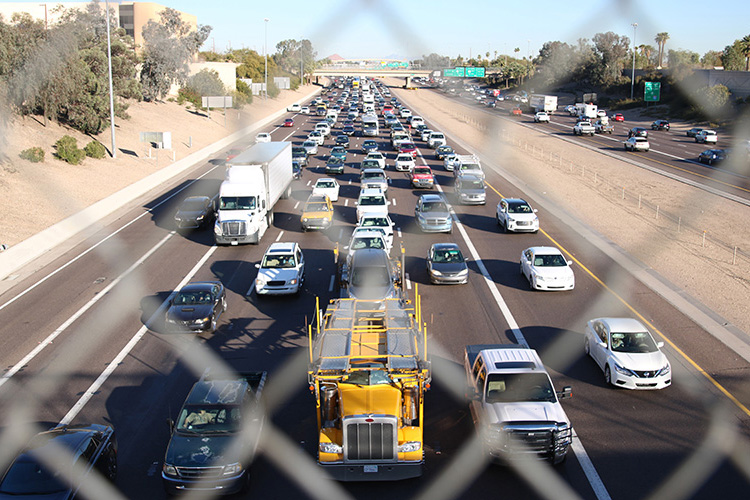The White House began its pitch Monday for President Joe Biden’s $2 trillion infrastructure proposal by spelling out constructions needs in all 50 states, including Arizona which got a grade of C on a recent infrastructure report card.
Biden unveiled his American Jobs Plan on March 31, to fund everything from roads and ports to veterans services and broadband.
“We need to build the infrastructure of today, not repair the one of yesterday,” said Biden, who met with a bipartisan group of lawmakers Monday to discuss the proposal.
READ ALSO: How Glendale’s $400M infrastructure investment is paying dividends
“The plan I propose is going to create millions of jobs, rebuild America, protect our supply chains, and revitalize American manufacturing,” he said during a meeting with computer chip manufacturers. “And it’s going to make America research and development a great engine again.”
But the very scope of the plan has drawn criticism from Republicans in Congress like Rep. Andy Biggs, R-Fountain Hills, who said in a letter to the White House last week that the infrastructure proposal ignores the nation’s “most critical transportation needs” and is “dominated by costly distractions.”
“You commit our nation to spending on initiatives completely unrelated to fixing the infrastructure Americans across the country rely upon every day,” Biggs’ letter said. “We should not be using an infrastructure bill to spend hundreds of billions of dollars on small business support, community investment, rural partnerships, and childcare facilities, among other measures.”
But Transportation Secretary Pete Buttigieg defended the plan, saying during a call with reporters Monday that it is “about making sure that America is No.1 and is leading the way in a highly competitive future.”
“The jobs plan is going to allow states and local governments to move forward with long overdue projects, to fix roads and bridges, to expand and modernize transit … not only in big cities but in small communities too,” Buttigieg said.
According to a state fact sheet released Monday by the White House, Arizona has 132 bridges and more than 3,100 miles of highway that are in poor condition. The report also said that Arizonans who rely on public transportation spend more time commuting, and that nonwhite households are twice as likely to commute via public transit.
The administration report also said that Arizona drinking water systems will need an estimated $9.1 billion over the next 20 years; that 410,000 renters in the state have to spend 30% of their income or more for housing because of a lack of affordable housing; and that 14% of Arizonans do not have access to broadband and 13% do not have internet – all areas the plan would fund.
The state fact sheets largely mirrored recent reports by the American Society of Civil Engineers that graded the states on a variety of infrastructure needs. Arizona got a C in the ASCE report for 2020.
The fact sheets lack detail on exactly where the money would be spent, referring instead to the total amount of funding nationally for each category, from child care to home energy improvements.
The plan would be funded with increases in corporate taxes that the White House said would “raise over $2 trillion over the next 15 years and more than pay for the mostly one-time investments” in the proposal.
The tax proposals include raising the corporate tax rate to 28%, closing loopholes that encourage companies to move jobs off-shore and urging other countries to adopt a minimum corporate tax rate to “end the race to the bottom” by countries looking to lure businesses.
Before meeting with lawmakers today to discuss the plan, Biden said he would be willing to negotiate how the package was paid for.
Rep. David Schweikert, R-Fountain Hills, who was not at Monday’s meeting, criticized the amount of new taxes in the plan in a tweet last week.
“Pres. Biden’s ‘infrastructure’ bill is merely a disguise for raising taxes on hard-working Americans, undoing Republicans’ efforts to reduce taxes and create record economic growth,” Schweikert’s tweet said. “It is crucial that any future policy be focused on supporting workers and businesses.”
But Andrew Sugrue, assistant director of policy and advocacy at the Arizona Center for Economic Progress, believes the U.S. has a historic opportunity to invest in the future with the American Jobs Plan.
“As we look toward the future, we have a historic opportunity to invest, to bring about a stronger recovery, create a more equitable economy where you can support all working people and people struggling in the job market, where all children can reach their full potential and where people have enough health coverage to get all of this without the fear of financial ruin,” Sugrue said Monday. “So I think that’s what the American Jobs Plan is able to do.”
Story by Haleigh Kochanski, Cronkite News




